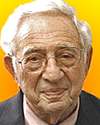 (source)
(source)
|
Arthur W. Galston
(21 Apr 1920 - 15 Jun 2008)
American biologist, plant physiologist and bioethicist whose work with herbicides led to the development of Agent Orange used by the American military as a defoliant during the Vietnam war. When Galston found his warnings had been ignored about the high toxicity of the chemical to both animal and human life, and destructiveness to the enviroment, he promoted bioethics.
|
Science Quotes by Arthur W. Galston (2 quotes)
In my view, the only recourse for a scientist concerned about the social consequences of his work is to remain involved with it to the end.
— Arthur W. Galston
'Science and Social Responsibility: A Case Study', Annals of the New York Academy of Science, 1972, 196, 223.
Nothing that you do in science is guaranteed to result in benefits for mankind. Any discovery, I believe, is morally neutral and it can be turned either to constructive ends or destructive ends. That’s not the fault of science.
— Arthur W. Galston
Quoted by Jeremy Pearce in 'Arthur Galston, Agent Orange Researcher, Is Dead at 88', New York Times (23 Jun 2008), B6.
See also:
- 21 Apr - short biography, births, deaths and events on date of Galston's birth.
 In science it often happens that scientists say, 'You know that's a really good argument; my position is mistaken,' and then they would actually change their minds and you never hear that old view from them again. They really do it. It doesn't happen as often as it should, because scientists are human and change is sometimes painful. But it happens every day. I cannot recall the last time something like that happened in politics or religion.
(1987) --
In science it often happens that scientists say, 'You know that's a really good argument; my position is mistaken,' and then they would actually change their minds and you never hear that old view from them again. They really do it. It doesn't happen as often as it should, because scientists are human and change is sometimes painful. But it happens every day. I cannot recall the last time something like that happened in politics or religion.
(1987) -- 


